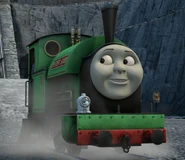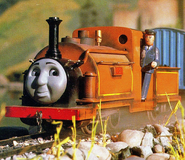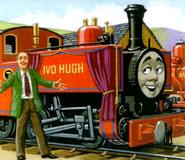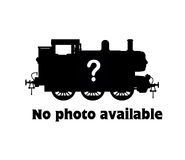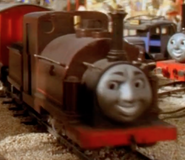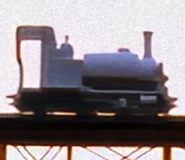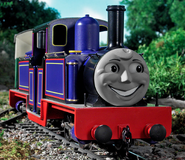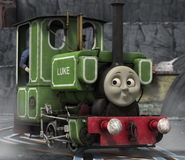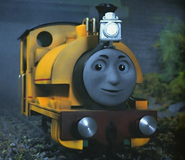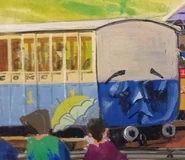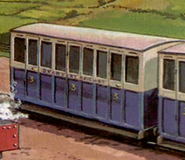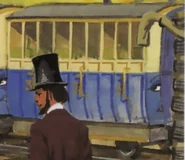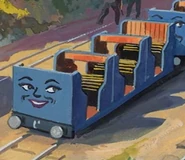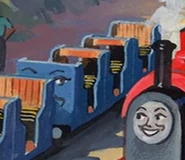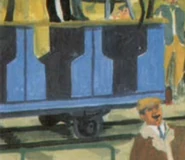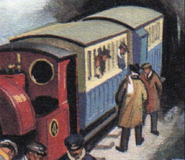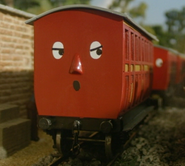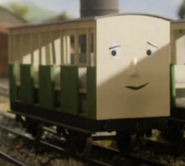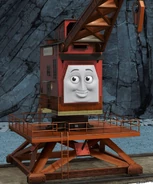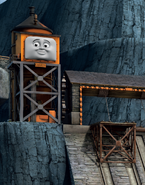The Skarloey Railway (abbreviated as SR), also known as The Little Railway, is a 2'3" (narrow gauge) railway which runs from the North Western Railway's station at Crovan's Gate to Skarloey. Beyond Skarloey, the line continues to a former slate quarry, now used as ammunition dumps.
The railway is owned by Sir Handel Lloyd Brown, who serves as its Chairman, and is run by Mr. Roger Sam, son of the previous controller, Mr. Peter Sam (currently Mr. Percival in the television series).
History
This narrow gauge railway had its beginnings in 1806 when a horse worked ”plate-way” was laid from Cros-ny-Cuirn to Balladwail. The Crovan's Gate Mining Company had a copper mine in the lower slopes of Ward Fell. The ore was brought to Cros-ny-Cuirn by pack-horses, and sent down in wagons to Balladwail for shipment. They relaid this line in 1820 with ”fish-belly” edge rail, and extended it up the Benglas valley to the mine. It was called quite simply "The Railroad", for there was no other in the whole Island. It was considered a marvel in its day. From Cros-ny-Cuirn a chain of five successive inclines strode boldly up to Ward Fell, and their remains, much overgrown, can still be seen from the road north of the level-crossing at Cros-ny-Cuirn.
Following the Ffestiniog Railway’s lead in 1863 however, improvements were called for. James Spooner was engaged to survey a line suitably graded for steam haulage. It was at first intended that this line, like its predecessors, should be a mineral line only. The valley it served was sparsely populated, and it was thought that perhaps one coach in addition to the set of quarrymen’s coaches would suffice for local needs. When, however, during the survey, the long-forgotten lake and hidden hollow of Skarloey was accidentally rediscovered, the Board’s thinking underwent a change.
Spas were popular at the period and offered the possibility of a lucrative passenger business. Skarloey’s mineral springs and sheltered situation took hold on the minds of some members of the Board, among them Shamus Tebroc who conceived the idea of developing Skarloey as a spa. An hotel and a number of villas were built as a speculation, and the gravity worked incline which had been installed for the conveyance of materials was retained and up-graded for coals, merchandise, and passengers’ luggage.
They renamed the line The Skarloey Railway. A set of the then most up-to-date passenger coaches were ordered from Brown, Marshall & Co., and the engines, Nos.1 and 2 were built by Fletcher, Jennings & Co. of Whitehaven, and named Skarloey and Rheneas respectively after the two places to which they hoped to attract people with their publicity campaign. At the time of the Railway's opening, its Controller was Mr. Mack.
For a few years the plan worked, but then, apart from a few keen anglers, and a steady trickle of summer visitors, numbers fell. This, though better than nothing, was far from the profitable venture for which the promoters had hoped.
By 1900 there were-signs too that the veins of copper were beginning to run out; but miners searching for further copper in the foothills came upon good slate. The Company’s main interest was in copper, but they had no objection to using slate as a secondary freight. They lost interest, however, when the copper ran out at last, and sold out in 1909 to a Mr. Handel Brown of Cros-ny-Cuirn. Mr. Brown was principal landowner in the valleys, and prospective M.P. for Sodor East.
Slate boomed during the First World War, but slumped badly afterwards. Mr. Brown nevertheless kept quarries and railway going for the sake of his tenants. Sir Handel - he was created a Baronet in 1937 - died in 1950, and his son, now Sir Handel II, inherited an estate crippled by death duties. Much as he would have liked to be able to do so, he could not afford to take his father‘s philanthropic view of the dubious bundle of assets he now held. The Railway’s Controller between 1936 and 1951 was Mr. Robert Sam, who stepped down in favour of his son in the latter year.
During the Second World War the old mines had been commandeered for ammunition dumps, and the line was worked to the limit providing slate for blitzed houses and pit props for mines. The borrowed locomotives and stock had now gone, and his own locomotives, rolling stock, and track were shockingly run down. Sir Handel II had however a fine Manager in Mr Peter Sam who, backed by his Foreman, Ivo Hugh, believed in the line, and was convinced that it had a future. They persuaded Sir Handel to delay closure for a year. During that year Rheneas, the one serviceable locomotive, was carefully nursed, and carried the whole burden of traffic; but this epic heroism would have availed little had it not been for two discoveries:.
(i) In the hills near Rheneas of a new and hitherto untapped bed of slate entirely free from metallic impurities, and thus in demand for many other purposes besides roofing, and
(ii) The discovery among the muniments of Ulfstead Castle in 1953 of a tattered copy of a document hitherto believed lost, The Book of Sir Harald, an epic poem in Sudric about the exploits of Sir Harald Marown, Regent of Sodor (1263-1275), a careful study of which suggested that Skarloey was the “Secret Sanctuary” to which on occasion he retired, and from which time after time he emerged with devastating force to fight invading Scots to a standstill. When ”digs” undertaken by the Sodor Archaeological Society found supporting evidence, interest grew and passenger traffic with it.
Falcon and Stuart (formerly Nos. 3 & 4 of the Mid Sodor Railway) were bought in 1952 from the Sodor Aluminium Company and renamed Sir Handel and Peter Sam respectively. As revenue further increased, Skarloey and Rheneas were rebuilt, the line was gradually relaid, two other locomotives, Rusty and Duncan, was acquired, and rolling stock rebuilt and added to.
The railway’s revival was such that in 1963 it was decided to extend round the lake as a tourist attraction. This was partly funded by the sale of the old slate quarry to the Ministry of Defence in 1960. This loop-line was opened in 1965 at the railway’s Centenary, and has proved its worth. In 1966, the Railway left private ownership when a Share Issue was floated and it became a Company.
In 1969, another former Mid Sodor Railway locomotive, Duke was discovered and brought to Crovan’s Gate. Now rebuilt, he forms part of the SR locomotive stud, and they are thus in the happy position of having locomotivepower to spare. They were thus able to help the Talyllyn Railway out of a difficulty. In 1982 the Talyllyn’s No. 3, Sir Haydn, urgently needed repairs, and was likely to be away for some time. Hearing of this Sir Handel Brown at once offered the loan of his No.3 as a replacement. Sir Handel performed his duties on the Talyllyn for two years to everyone’s satisfaction and has now returned to his home shed.
In 1980, the Skarloey Railway Board unanimously approved Roger Sam to succeed his father as the Railway’s Controller. In 1989, the Railway constructed a second diesel locomotive, Fred, from the parts of two bought from the National Coal Board. In 1991, Mr. Ivo Hugh retired as Foreman and was succeeded by his son, David Hugh. Five years later, in 1996, the Railway constructed the latest addition to its locomotive fleet, Ivo Hugh, named in honour of the former Foreman.
Operations and Route
In the Railway Series, the Skarloey Railway starts at Crovan's Gate. It passes under a road bridge by the Thin Controller's house. Some thirty chains beyond the bridge the line climbs sharply before levelling out for the last mile to Cros-ny-Cuirn. This is the stretch where Duncan came off the rails. Before Cros-ny-Cuirn, the line goes to a crossing located by Mr Hugh's Cottage (seen in the last illustration of Home at Last). Just north of the station the line swings over the road in a level crossing (incorrectly illustrated as a road bridge). Road and rail run side by side for two miles (where Sir Handel and George had their incident) till first the road and then the railway swing west across the river. When road and rail divide, the road dips sharply, and swings west (Sir Handel is seen there in Home at Last) to cross the river by a hump-backed bridge. The railway, without change of gradient, crosses by a girder bridge (Skarloey is seen crossing this bridge in Home at Last). Two miles of lonely moorland follow. It was here that Rheneas' valve gear jammed. After a mile and a half, the line reaches Glennock.
Beyond Glennock, the line swings north once more through arable and pasture land, passing scattered cottages and farms. From each house there is usually a well marked path leading to a stile or gate in the lineside hedge (Skarloey is seen passing it in Old Faithful). These are unofficial, but traditional Request Stops for certain trains and are well used on Market Days (Skarloey is seen here in Skarloey Remembers). It was on this stretch, that Skarloey in 1865 "bounced" the Manager off the footplate into a bush. Still gently climbing, the line crosses the river again by another girder bridge, and enters to a tunnel. North of the tunnel the line runs along a ledge, and is subject to "wash-outs" after heavy rain. Here, Peter Sam's crew found a drain pipe along the line. The line crosses the Viaduct, until it reaches Rheneas.
After Rheneas, the line comes to Lakeside Junction (also named Quarry Siding), where the loop line was opened. The loop line runs round and above the lake on a ledge cut in the hillside among the trees. There is one station, Lakeside, which serves a picnic area. The line ends at the top station at Skarloey. Beyond there are a run round loop, sidings, locomotive and carriage sheds.
Passing a tumble-down gate (Sir Handel), the line reaches the slate quarries.
The line's main traffic consists of passengers, local and tourist, and slate.
In the television series, the Skarloey Railway is considerably expanded. It starts at Crovan's Gate near the Steamworks and follows the Railway Series route until the loop around the lake. A branch then continues west from Skarloey to the Blue Mountain Quarry and then crosses the Peel Godred Branch south of Kirk Machan. After crossing the line it terminates in Ulfstead where it connects with the private railway at Ulfstead Castle. Here it connects with the Ulfstead Branch Line. It also has a branch line that separates from the main line in-between Glennock and Rheneas that runs to Vicarstown. Stepney's Branch Line also works alongside it.
Appearances
The Skarloey Railway appeared in the Railway Series books; Four Little Engines, The Little Old Engine, Gallant Old Engine, Very Old Engines, Great Little Engines, and New Little Engine. It also featured in Mountain Engines and Duke the Lost Engine.
Television series
The Skarloey Railway was one of the few railways that made it into the television series. It was introduced in the fourth series and appeared regularly until the twelfth series with the switch to full CGI. Since the sixteenth series it has only had 6 feature episodes and sporadic appearances.
Series featuring
Specials
Series absent
|
Trivia
- The line was inspired by and based on the Talyllyn Railway in Wales, where the Rev. W. Awdry volunteered as a guard in the 1950s. Additional inspiration was taken from the Ffestiniog, Corris, Welsh Highland and Croesor railways.[1] In addition to his personal experiences on the Talyllyn, Awdry drew inspiration from L. T. C. Rolt's book Railway Adventure for his own stories.
- Every Skarloey Railway engine featured in the Railway Series, barring Duke, has a counterpart on the Talyllyn Railway.
- When the railway returned to the series in CGI, the line became double tracked.
- The Reverend's own Skarloey Railway models and layout can be seen at the Talyllyn Railway Museum.
- On the Official Website, the railway is incorrectly listed as a branch line of the North Western Railway.
- Unlike its basis, the Talyllyn Railway, the Skarloey Railway has a loop-line near the top station and a tunnel.
- In the CGI series, the railway is modelled as meter gauge rather than the prototypical gauge of 2ft 3in. This was likely done so that Victor could fit on the Skarloey Railway's tracks and so the narrow gauge tracks in the Steamworks didn't need to be remodelled.
Rolling Stock
Locomotives
Railway Series only
Television Series only
Coaches
Railway Series only
Television Series only
Road Vehicles
Other
References
- ↑ "The Thomas the Tank Engine Man" p. 206




